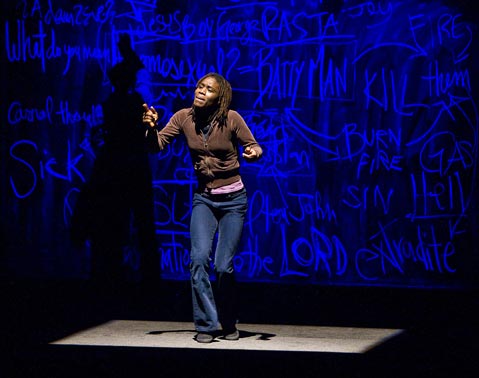DV8’s To Be Straight With You
London-Based Physical Theater Company Delivers a Powerful Production

London’s DV8 Physical Theatre has created an unforgettable piece of performance art with To Be Straight With You. It’s not just that the topic of homosexuality is politically timely and emotionally charged, although that helps. So does the talent, versatility, and clear commitment of the small cast. What really gives this piece its power is that the entire script is taken verbatim from interviews the company conducted. Whether we’re hearing a fundamentalist Islamic preacher denouncing a gay man’s lifestyle or a lesbian woman from Jamaica describing being beaten by her family because of her sexual orientation, we’re hearing real life stories.
As a result, this show isn’t exactly easy on the audience. There’s a lot of brutality in these accounts: violence and hostility both threatened and suffered. Then there are the accents: Rastafarian, Cockney, and Pakistani English. While this piece demands the audience’s stamina, it delivers refreshment in the form of an unusually candid examination of the issue, as well as in luscious movement, memorable character sketches, and innovative use of sets and projections.
“I don’t think I’m gay,” a young man tells the audience, backing up against a chalkboard, wringing his hands. “I think I have an emotional problem.” Beside him, another male performer scribbles diagrams and notes. When he draws a heart on the speaker’s shirt, the young man brushes it off hastily.
“I don’ wanna say nuffin’, but it’s nasty,” declares a young woman. Her feet shuffle rapidly beneath her, as if she wants to run away from the conversation.
There is no narrator to tell us what conclusions to draw from the divergent statements that comprise this show. In addition to man-on-the-street interviews, DV8 presents the voices of leading British figures such as right-wing politician Iris Robertson and human rights activist Peter Tatchell. Vivid images include a gay Iraqi doctor being hooded and beaten as he describes the murder of his partner, and a deejay who gyrates in the booth while defending his choice to play dance music with homophobic lyrics.
Scattered across the dark landscape of intolerance are moments of levity. A young Muslim man skips rope as he recounts being stabbed by his father after coming out. “I don’t think religion is for me,” he concludes, skipping so fast he appears weightless. “I just like being free as a bird.”
To Be Straight With You avoids polemical tirade. Instead, it offers a potent examination of the intersection between religious beliefs, cultural norms, and sexual practices, as well as an opportunity to reexamine the limits of our tolerance.



